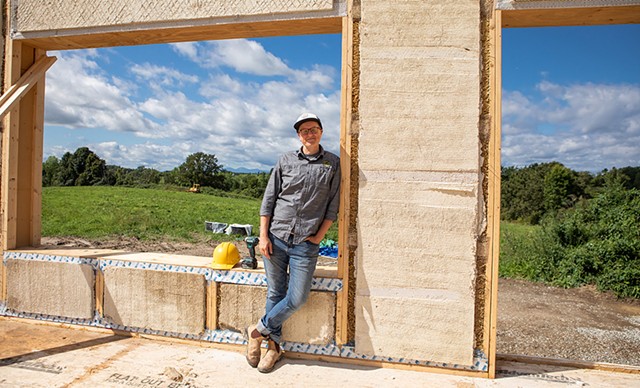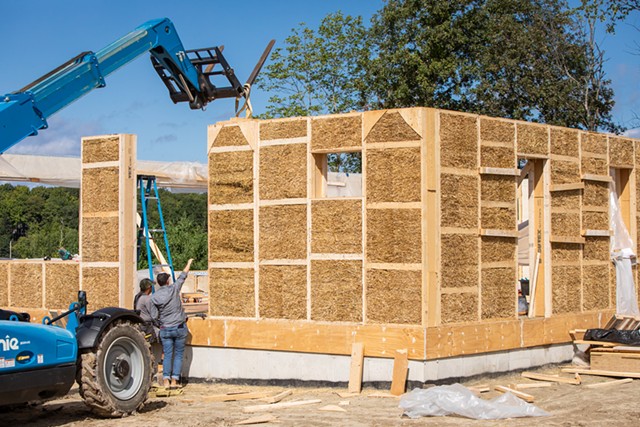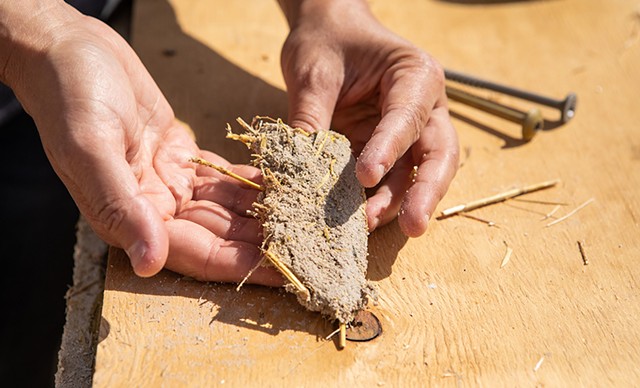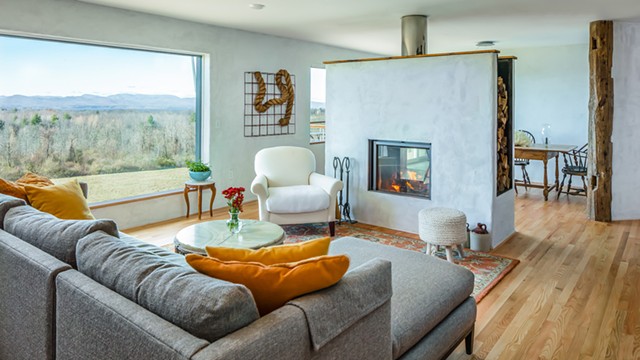New Frameworks, a construction company in Vermont, specializes in natural and local materials. A vital part of its mission is to “draw down” carbon in its projects to reverse emissions. “Climate justice and climate response is not a theory to us; it’s a practice,” Ace McArleton, who cofounded the company in 2006, said. “And we wake up every day knowing that every action we take within New Frameworks is informed by that.”

Organic straw bales are used to insulate wall panels. Using a plant-based material such as straw in construction can be environmentally beneficial because it stores carbon from the atmosphere. The agricultural by-product also contains less embodied energy than other kinds of insulation, meaning less energy is used to produce it. The carbon footprint is further reduced if it’s a locally sourced product that travels a relatively short distance for use in building.
 The prefab wall panels are just one of the services and products New Frameworks offers. The company, which is booking into 2023, works with residential and commercial clients on projects including renovation, new construction and improving building performance in existing structures. The latter effort requires an analysis of how air, moisture and heat move in a building, McArleton said. “We ask, ‘How is this building working?'” he explained. “‘What are its best areas and areas that need work? And how do you do that using materials that are low-carbon and nontoxic?'”
The prefab wall panels are just one of the services and products New Frameworks offers. The company, which is booking into 2023, works with residential and commercial clients on projects including renovation, new construction and improving building performance in existing structures. The latter effort requires an analysis of how air, moisture and heat move in a building, McArleton said. “We ask, ‘How is this building working?'” he explained. “‘What are its best areas and areas that need work? And how do you do that using materials that are low-carbon and nontoxic?'”
Jacob Deva Racusin, who directed the natural building certificate program at Yestermorrow Design/Build School joined New Frameworks in 2009. He and McArleton wrote a book together called The Natural Building Companion. Racusin and several other members of the team share the title of cofounder.
 In addition to its commitment to natural materials and, as McArleton puts it, “their effective use in our climate,” New Frameworks is committed to workplace equity and social justice. From the start, a primary aim of the company has been hiring and training transgender people, gender-nonconforming folks, people of color and women, said McArleton, who identifies as trans.
In addition to its commitment to natural materials and, as McArleton puts it, “their effective use in our climate,” New Frameworks is committed to workplace equity and social justice. From the start, a primary aim of the company has been hiring and training transgender people, gender-nonconforming folks, people of color and women, said McArleton, who identifies as trans.
“Representation and presence in the building trades is a difficult thing for anybody who’s not a white, able-bodied, cisgender dude,” he said. McArleton grew up in suburban Chicago and Ann Arbor, Mich. He studied environmental science with a focus in chemistry at Antioch College in Yellow Springs, Ohio. He developed a particular interest in toxins, especially following a visit with the Environmental Field Program to Love Canal, the site of a 1970s environmental disaster in Niagara Falls, N.Y.
He walked through the neighborhood with a “former resident-turned-activist, a mom whose kids got sick, and one who died, due to the toxic chemical exposure,” McArleton wrote in an email. “Her passion and loss fueled me to want to fight for ecological and social justice, and to see how those were intertwined.”
The company has undergone several iterations. It’s now an employee-owned business whose team members, including former farmworkers, speak both Spanish and English on worksites to the best of their abilities. New Frameworks is developing prototypes for on-farm housing for migrant workers — and seeking design input from the people who will live there.
 “A huge part of our work has been investing our time and money into R&D to prove the efficacy of natural materials in this climate,” McArleton said. “We’re not just interested in doing hippie shit. I want something that’s actually going to be effective.”
“A huge part of our work has been investing our time and money into R&D to prove the efficacy of natural materials in this climate,” McArleton said. “We’re not just interested in doing hippie shit. I want something that’s actually going to be effective.”
You can read the original article at www.sevendaysvt.com
